23 PENGGUNAAN MODEL LISTENING TEAM SEBAGAI SARANA MENINGKATKAN KEMAMPUAN BERTANYA PADA PEMBELAJARAN IPA SISWA KELAS X SMK YP 17-2 MADIUN
https://doi.org/10.25273/florea.v2i1.402
Keywords:
listening team, ability to askAbstract
Implementation of Vocational Education in Madiun 17-2 YP use the lecture method, so that the activity asks students less. The aim of research to improve the ability to ask students in learning science. Qualitative research approach used classroom action research (PTK), which consists of two cycles. The subjects included 23 students, collecting data using observation sheets to determine the ability to ask, student activities, and the quality of learning. The research result an increase in the ability to ask the first cycle of 50%, 69.56% second cycle. Student activity 62% cycle I Cycle II 73.91%, active criteria. The quality of learning cycle I cycle 71% II 80%. Conclusion The results of the research team use listening learning model can improve the ability to ask.Downloads
Download data is not yet available.
Downloads
Published
2015-04-01
Issue
Section
Articles
License
Every accepted manuscript should be accompanied by "Copyright Transfer Agreement" prior to the article publication.
Florea : Jurnal Biologi dan Pembelajarannya by http://e-journal.unipma.ac.id/index.php/JF is licensed under a Creative Commons Attribution-ShareAlike 4.0 International License.
Author who publish with this journal agree to the following terms:
- Author not hold and retain copyright and grant the journal of first publication with the work simultaneously licenced under Creative Commons Atribution Licence that allows others to share the work with an acknowledgment of the work's authorship and initial publication in this journal.
- Authors are able to enter into separate, additional contractual arrangements for the non-exclusive distribution of the journal's published version of the work with an acknowledgment of its initial publication in this journal.
- Authors are permitted and encouraged to post their work online prior to and during the submission process, as it can lead to productive exchanges, as well as earlier and greater citation of published work.
Â










